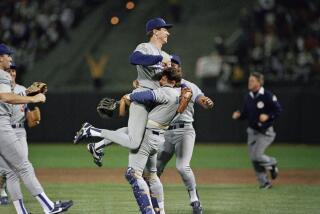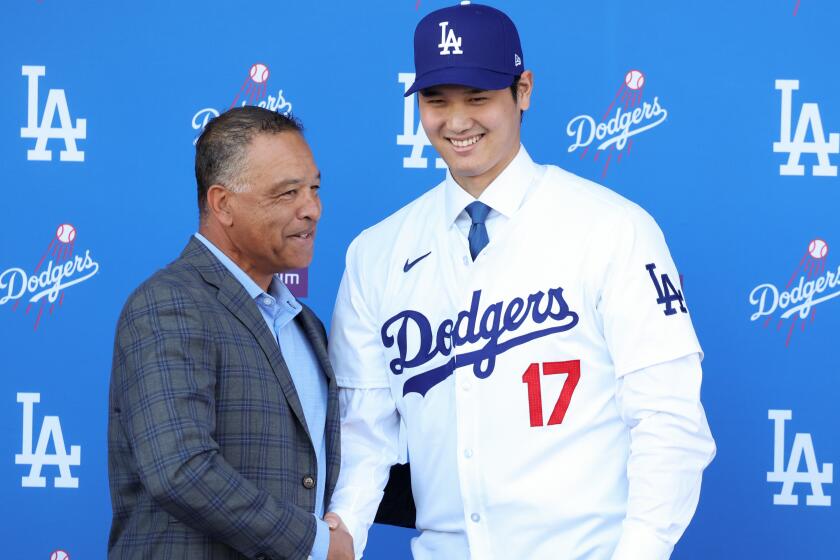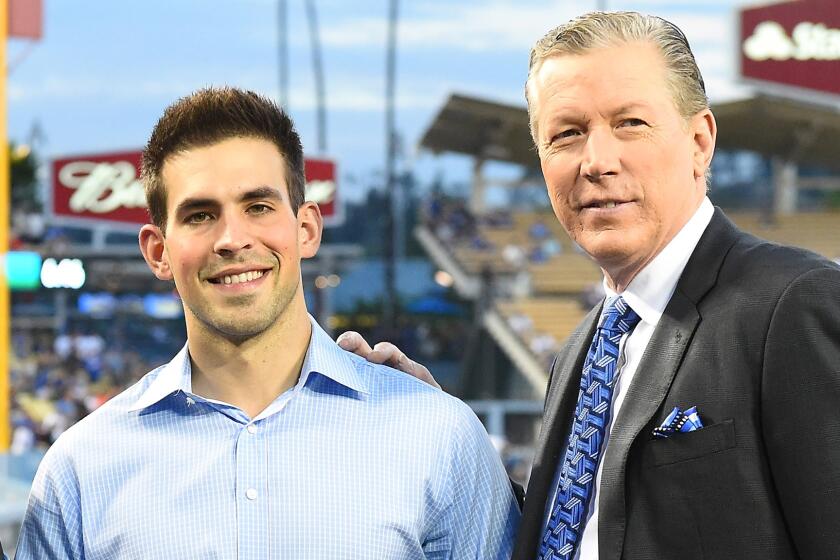Waiting is the hardest part for Hodges’ family and fans
Joan Hodges tries not to build her hopes up too high.
Maybe that way, if disappointment and heartbreak rap once again upon the door of Gil Hodges’ widow, they won’t sting quite as much.
Her late husband, a slugging, smooth-fielding first baseman who helped the Dodgers win World Series championships in Brooklyn and Los Angeles, could be introduced today in Las Vegas as a baseball Hall of Famer, ending a long and sometimes painful wait for family, friends and fans.
On the other hand, he could be rejected again by the Veterans Committee of the National Baseball Hall of Fame, which this year considered a group of finalists that included Joe Torre, Maury Wills, Dick Allen, Jim Kaat, Tony Oliva, Al Oliver, Vada Pinson, Ron Santo and Luis Tiant.
As Joan Hodges knows from experience, nothing is guaranteed.
Asked what it would mean to see her husband enshrined at Cooperstown, the 82-year-old great-grandmother says politely but forcefully from her Brooklyn home, “I hope you don’t misunderstand me, but I don’t do this. I stopped doing this many years ago. Those are questions I just don’t address anymore.”
She pauses a moment before adding, “If he gets in, we’ll be absolutely elated. If he doesn’t, he’s in mine and my children’s hall of fame forever.”
Why he’s not in baseball’s Hall is a subject for debate.
Supporters say that Hodges, who in 1969 managed the “miracle” New York Mets to a World Series championship and in 1972 died from a heart attack two days before his 48th birthday, belonged in Cooperstown years ago.
“It’s beyond us why he hasn’t been elected,” says Marty Adler of Plainview, N.Y., founder and president of the Brooklyn Dodgers Hall of Fame and distributor of a bumper sticker -- “Cooperstown Needs Gil Hodges -- that plainly spells out his sentiment. “Some people say I’m so prejudiced toward the Brooklyn Dodgers that I can’t accept the fact that he’s just not good enough.
“But you’re supposed to look at a player during his playing tenure, and in my honest opinion he was clearly the best first baseman of an entire decade.”
No first baseman who played the bulk of his career in the 1950s, Hodges’ heyday, has been elected to the Hall of Fame. Hodges hit 370 home runs, four in one game, and batted .273 over 18 seasons with the Dodgers and Mets, with time out of baseball during World War II to serve as an anti-aircraft gunner.
The numbers are almost identical to those of Tony Perez, who is a Hall of Famer but was not equal to Hodges as a defensive first baseman.
A three-time Gold Glove winner -- the award wasn’t created until 1957, his last All-Star season -- Hodges averaged 32 home runs and 108 runs batted in during a nine-year stretch from 1949 to ’57 and was an eight-time All-Star. He played in seven World Series, helping the Dodgers win championships in 1955 and 1959.
The argument against Hodges’ Hall of Fame worthiness is that he never led the National League in any batting category, never finished higher than seventh in voting for most valuable player and fell short of 2,000 hits.
It hasn’t helped that his death at an early age took him out of the public eye. Also, it has been said that the 1950s Dodgers already are well represented in the Hall by Duke Snider, Pee Wee Reese, Roy Campanella and Jackie Robinson.
“So what?” says former Dodgers pitcher Carl Erskine, dismissing the latter argument. “He contributed to a team that was dominant in the National League, often in ways that it’s hard to tell a committee, ‘Well, here’s what he did.’
“Here’s a point that’s not in the stats, but I think it carried weight for Pee Wee. Pee Wee was often identified -- and rightly so -- to have been a champion for Jackie. But let me tell you: Hodges also played alongside Jackie, and he was the peacekeeper on that infield.
“Everybody respected Hodges. He was big and strong, and when there was a pileup at second base that could erupt into some kind of brawl, Hodges was there immediately, pulling guys off and keeping the peace.”
In 15 years on the Baseball Writers Assn. ballot, from 1969 to ‘84, Hodges never was named on more than 63.4% of the ballots, short of the 75% required for election. Still, until Jim Rice surpassed his total last year, no player had received more votes than Hodges without being elected to the Hall of Fame.
Since 1984, his last year on the writers’ ballot, Hodges has been regularly considered by the Veterans Committee, falling one vote short of election in 1993. But the ever-evolving committee, which votes only every other year, has not elected a player to the Hall since 2001. This year, the Hall fate of Hodges and the other nine finalists was determined by a vote of the 64 living Hall of Famers.
Hodges’ supporters hope they put him over the top.
“This is a long time we’ve been waiting,” Adler says. “Let the widow enjoy it. Let Joan Hodges and her children enjoy it. That would be nice.”
In Brooklyn, Joan Hodges tries to stay grounded.
“But naturally,” she says, “you can imagine how I’m hoping and praying, only because it’s such an injustice and he so rightfully deserves the honor.”
--
More to Read
Are you a true-blue fan?
Get our Dodgers Dugout newsletter for insights, news and much more.
You may occasionally receive promotional content from the Los Angeles Times.






